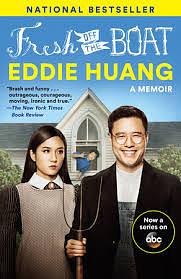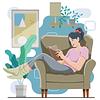Take a photo of a barcode or cover
I found this book very difficult to read as it didn't keep me interested one bit. There was a lot of slang and swear words which weren't explained in full detail, causing a multitude of confusion. Also, there were a variety of individuals that were named however, were never explained fully. I felt like I was reading a large run-on sentence that never ended. In all honesty, I wasn't able to grasp the concept of the book as almost the entire book was about Eddie hanging out with his friends and getting into trouble. I found that the last part of the book was somewhat more enjoyable as the swear words were at a minimum, and Eddie seemed to be more mature. However, more than three-quarters of the book made me want to give up and stop reading. Though I was curious to see what happened to Eddie at the end of the book, it definitely wasn't worth my time. I'm sure that Eddie had quite a fascinating life story however, surely it wasn't necessary to write it down in book form as it was written.
I really wanted to like this book, but I just couldn't get down with it.
Imagine the most braggadocious rapper you've ever heard. You like his rhymes and style in 3-4 minute bursts. Now imagine reading 250+ pages of this. This constant convincing that the rapper is smarter, quicker and better dressed than everyone. He sucked at school because he was so great at school. He was the best fighter in the playground. Welcome to a book about the greatest man in the world!
I found Eddie Huang exhausting. When I was just listening to him tell me his story, his pain, how proud he was of himself for succeeding when so many people didn't want him to, it felt earnest and sincere. But then the bragging. So much bragging. Another theme was him attempting to convince the reader that he didn't care about whiteness and white culture when he so clearly felt rejected by it. When he called himself a "rotten banana" and wanted me to believe that he didn't also find it painful that certain people in his own culture didn't accept him. And I get it. Because I was this person at one point in my life. "Too black for the whites, too white for the blacks," I would say. And then I realized that my ass is black no matter what. When I'm listening to rock and roll, or rap. Eating fried chicken or boiled potatoes (what do white people eat? I mean, not like haggis, but what food represents American whiteness? Cucumber sandwiches? I digress.). The only person who needs to be comfortable is me.
And I wanted to believe that Eddie was being honest, but it read like a ton of posturing. Posturing about HOW Asian he was. HOW real and hip hop he is. HOW anti-white America he is. (Though, dude, you went to rush a white fraternity "just to see"? Miss me with that. You wanted in, but you hated authority and couldn't keep up the facade. Again, I GET IT, but I don't believe that story the way it was told for a second.)
It was loaded with hip-hop references. I thought I'd like that part, but after a while, it just felt exhausting. Like a white person greeting me with an overly complicated handshake and asking me if I like The Wire and Barack Obama. I GET IT. YOU LIKE BLACK STUFF. I promise I believe you. You don't have to bury me in Wu Tang lyrics. All-in-all, this book read like Eddie Huang had a lot to prove. I'm happy for his success. Happy he wrote a book, (hell, I still haven't) happy he's still making buns and changing lives one dumpling at a time. But I cannot with all the bravado in this book, I just cannot.
Imagine the most braggadocious rapper you've ever heard. You like his rhymes and style in 3-4 minute bursts. Now imagine reading 250+ pages of this. This constant convincing that the rapper is smarter, quicker and better dressed than everyone. He sucked at school because he was so great at school. He was the best fighter in the playground. Welcome to a book about the greatest man in the world!
I found Eddie Huang exhausting. When I was just listening to him tell me his story, his pain, how proud he was of himself for succeeding when so many people didn't want him to, it felt earnest and sincere. But then the bragging. So much bragging. Another theme was him attempting to convince the reader that he didn't care about whiteness and white culture when he so clearly felt rejected by it. When he called himself a "rotten banana" and wanted me to believe that he didn't also find it painful that certain people in his own culture didn't accept him. And I get it. Because I was this person at one point in my life. "Too black for the whites, too white for the blacks," I would say. And then I realized that my ass is black no matter what. When I'm listening to rock and roll, or rap. Eating fried chicken or boiled potatoes (what do white people eat? I mean, not like haggis, but what food represents American whiteness? Cucumber sandwiches? I digress.). The only person who needs to be comfortable is me.
And I wanted to believe that Eddie was being honest, but it read like a ton of posturing. Posturing about HOW Asian he was. HOW real and hip hop he is. HOW anti-white America he is. (Though, dude, you went to rush a white fraternity "just to see"? Miss me with that. You wanted in, but you hated authority and couldn't keep up the facade. Again, I GET IT, but I don't believe that story the way it was told for a second.)
It was loaded with hip-hop references. I thought I'd like that part, but after a while, it just felt exhausting. Like a white person greeting me with an overly complicated handshake and asking me if I like The Wire and Barack Obama. I GET IT. YOU LIKE BLACK STUFF. I promise I believe you. You don't have to bury me in Wu Tang lyrics. All-in-all, this book read like Eddie Huang had a lot to prove. I'm happy for his success. Happy he wrote a book, (hell, I still haven't) happy he's still making buns and changing lives one dumpling at a time. But I cannot with all the bravado in this book, I just cannot.
Like spending hours listening to the most annoying kid in your pre-algebra class boasting about things like shoplifting hip-hop CDs at Best Buy to bring back to his mansion and "wilding" at parties ("I was toe up!") What a dick. If you like bros who call all women "shawties" and all men "Son" you will likely find this book to be hilarious. "Hilarious" is also the term the author uses to describe his friend opening fire at a frat party. I call bullshit on this book.
Didn't finish it. Not very funny. I'm glad they put the light-hearted spin on the tv show.
adventurous
funny
medium-paced
emotional
funny
informative
reflective
fast-paced
funny
lighthearted
reflective
slow-paced
medium-paced
Eddie Huang does an incredible job of painting the world through his eyes. His method of storytelling not only paints a clear and vivid picture of the Huang family, but it also actively puts the reader in the author's shoes. Huang does an excellent job of making something so familiar to the white American feel as foreign as it would to someone approaching it for the first time. I relate to a lot of Eddie's childhood pain, and having lived in Orlando, I appreciate the accurate and nostalgic references to what was once the author's (and my own) home. CW- there are instances of abuse in this memoir that almost dismiss the behavior. The subject is approached without analysis, however, I also acknowledge that that's not what the story's about and that at the time this was written, the author may not have fully comprehended the harm they experienced. I hope that in writing this book, the author found peace and closure with some of their more painful experiences.
It's like four o'clock in the morning but I just couldn't stop reading. Fascinating, blunt, and maddening. And form mirroring content, I love that the voice of the narration matches the voice of the author through the different stages of his life - no easy feat. Not thrilled about the pervasive misogyny, though.







